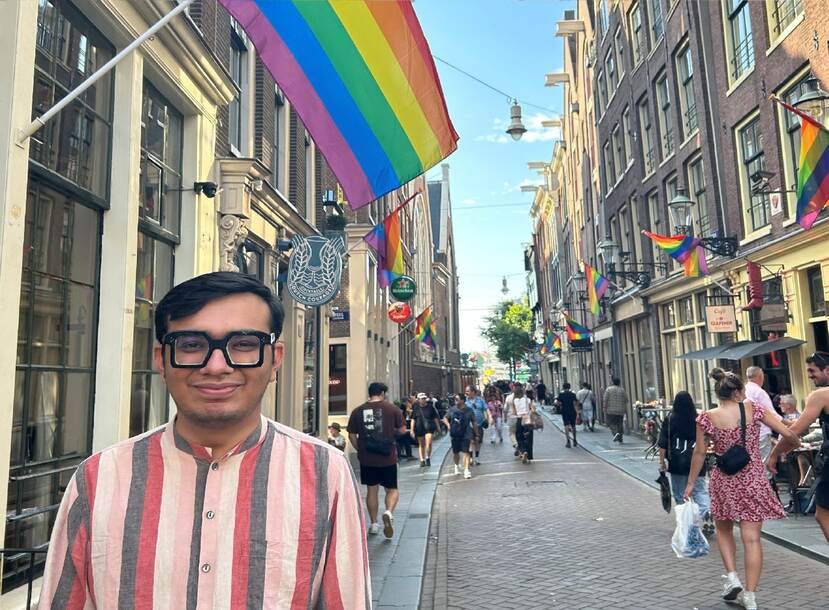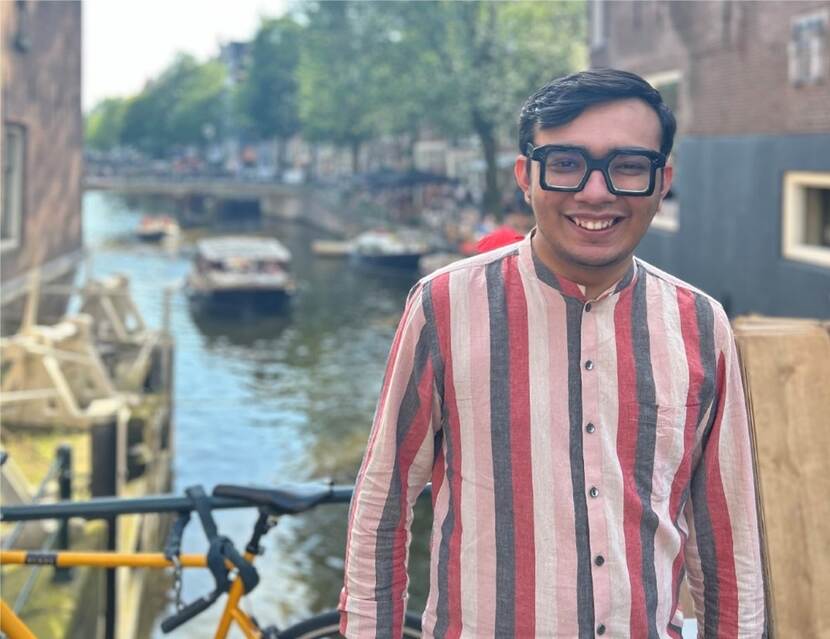Fighting for equal rights in India
Weblogs
In a country where tradition often clashes with modern values, Rohin Bhatt is making a profound impact as a human rights lawyer. His focus is on defending equal rights for LGBTIQ+ persons, both in and out of court. Despite the difficulties, he finds motivation in the small wins: ‘It’s the life of one couple granted protection by a court from their violent families that makes it all worth it.’

Rohin’s path to becoming a human rights lawyer was deeply personal. As one of the few openly queer lawyers in India, his own experiences of discrimination and bias motivated him to fight for others facing similar challenges.
‘I saw how deeply ingrained prejudice could affect people's lives, and I knew that the law could be a powerful tool for change,’ he says. His commitment to human rights is rooted in a belief in democracy and the rule of law, which states that everyone’s basic rights are respected. ‘For me, a lot of it comes from holding the state accountable for breaches of human rights,’ Rohin explains. This belief drives him to ensure that everyone, regardless of their identity, is treated fairly and justly.
Rohin visited the Netherlands recently to participate in the Building Bridges-programme. Every year, the Ministry of Foreign Affairs organises the Building Bridges programme, with international LGBTIQ+ human rights defenders. This programme expands participants' networks and provides essential knowledge and training, with empowerment as a key recurring theme.
Legal reforms
The decriminalization of homosexuality in India in 2018 was a major victory, but societal acceptance is still a work in progress. Rohin’s involvement in high-profile cases, such as the push for marriage equality, has been both challenging and enlightening.
‘Post decriminalisation, social acceptance is growing, but there is still much work to be done,’ he notes. The recent attempt to secure marriage equality revealed persistent issues, such as online and offline homophobia. ‘There was still a lot of homophobia.’ This ongoing struggle shows that while legal progress is being made, social acceptance often stays behind.
‘It’s these smaller changes that I can see that are far more meaningful.’
Supporting people beyond the courtroom
Rohin’s role extends beyond the courtroom. He provides crucial support to individuals facing discrimination, helping them with everything from legal issues to emotional support. ‘My work is not just about representing people in courts. It’s also about being there for them, helping them live their lives with less stress,’ he explains.
His approach combines formal legal work with personal care. Rohin believes that supporting individuals on a personal level is just as important as winning legal battles. ‘It’s these smaller changes that I can see that are far more meaningful.’
Handling setbacks
Facing setbacks, such as last year’s defeat in the marriage equality case, can be tough. Rohin acknowledges the personal impact of such losses, both professionally and emotionally.
‘The losses are definitely harder to take than the wins,’ he admits. Despite these challenges, he finds motivation in the smaller victories and the ongoing support he can offer to people in need. ‘It’s the life of one couple granted protection by a court from their violent families that makes it all worth it.’
Confronting homophobia
Dealing with homophobia is another part of Rohin’s reality. In a country with conservative views on LGBTIQ+ issues, confronting such opposition can be draining.
‘For your own sanity, you have to stop having certain conversations,’ Rohin advises. His focus on legal work helps him manage the personal attacks he faces. ‘Although I face severe backlash and online harassment, my work remains on the legal aspects, which helps me navigate the personal challenges.’
Access to justice in India is a significant challenge due to the country’s vast size and diversity. Rohin is working to build a network of supportive lawyers.
Building a network for justice
Access to justice in India is a significant challenge due to the country’s vast size and diversity. Rohin is working to build a network of supportive lawyers to address this issue, understanding that there are more people in need of help than there are resources available.
‘Access to justice truly is a big challenge for us,’ he says. His efforts aim to bridge the gap between the demand for legal support and the available resources. ‘With too few lawyers and too many people needing assistance, we do as much as we can with limited resources.’
Looking ahead, Rohin remains realistic about the future. He knows that significant change takes time: ‘This may be a hot take, but I stay pessimistic because it helps me stay focused,’ he explains. This perspective helps him avoid complacency and continue fighting hard for progress.
Learning from Building Bridges
Participating in the Building Bridges programme has been a valuable experience for Rohin. It has allowed him to learn from others around the world and apply those lessons to his work in India.
‘The programme has been extremely enlightening,’ Rohin shares. ‘Learning from others' successes and failures provides valuable lessons that can be applied to our own strategies.’ This global exchange helps him refine his approach and build stronger connections with allies worldwide.
